 Alaunt is originated from Afghanistan but St. John's Water Dog is originated from Canada. Alaunt may grow 32 cm / 13 inches higher than St. John's Water Dog. Alaunt may weigh 27 kg / 60 pounds more than St. John's Water Dog. Both Alaunt and St. John's Water Dog has same life span. Alaunt may have more litter size than St. John's Water Dog. Both Alaunt and St. John's Water Dog requires Low Maintenance.
Alaunt is originated from Afghanistan but St. John's Water Dog is originated from Canada. Alaunt may grow 32 cm / 13 inches higher than St. John's Water Dog. Alaunt may weigh 27 kg / 60 pounds more than St. John's Water Dog. Both Alaunt and St. John's Water Dog has same life span. Alaunt may have more litter size than St. John's Water Dog. Both Alaunt and St. John's Water Dog requires Low Maintenance.
Basic Information
Group:
Working dog
Working dog
undefined
Afghanistan
Canada
Weight Male:
20 - 68 kg
44 - 150 pounds
Weight Female:
16 - 60 kg
35 - 133 pounds
Life Span:
10 - 12 Years
10 - 12 Years
Other Names:
White Kazbegi, White Balkan dogs, Alaunt Gentil, Alaunt de Boucherie, Boucherie
St. Johns Dog, Lesser Newfoundland, St. John’s Newfoundland
Colors Available:
various
black
Coat:
short
short, thick coats
Shedding:
Minimal, Seasonal
Seasonal
Temperament:
Affectionate, Alert, Cheerful, Courageous, Curious, Energetic, Gentle, Lively, Loyal, Protective
Intelligent, Loving, Responsive
Grooming:
Low Maintenance
Low Maintenance
Trainability:
Moderate
Moderate
New Owners Friendly:
No
Yes
History
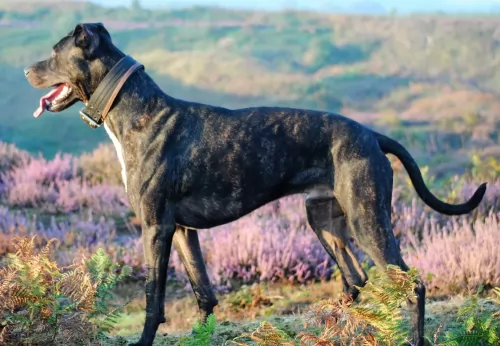 Alaunt is an extinct breed that existed 3000 years ago since 300 years ago. They were very popular dogs and people used them for many different tasks. They were a perfect working dog, but also they were used for wars and many other situations. Since the migrating was very common through the history, there were many different Alaunt breeds all over the Europe and Asia. Alaunt originated from central Asia, probably Afghanistan.
Alaunt is an extinct breed that existed 3000 years ago since 300 years ago. They were very popular dogs and people used them for many different tasks. They were a perfect working dog, but also they were used for wars and many other situations. Since the migrating was very common through the history, there were many different Alaunt breeds all over the Europe and Asia. Alaunt originated from central Asia, probably Afghanistan.
 The breed known as the St. John’s water dog is an extinct landrace breed. They were domestic dogs found in Newfoundland and at times were called the lesser Newfoundland. There is not much information available about the other breeds that went into its development. Hypothetically it is believed they are a mix of the Irish, Old English and Portuguese dogs bred to work.
The breed known as the St. John’s water dog is an extinct landrace breed. They were domestic dogs found in Newfoundland and at times were called the lesser Newfoundland. There is not much information available about the other breeds that went into its development. Hypothetically it is believed they are a mix of the Irish, Old English and Portuguese dogs bred to work.
It is also thought that other breeds in their family tree, descending from them, include the Golden Retriever, the Flat-Coated Retriever, the Chesapeake Bay Retriever, the Labrador and the Curly-Coated Retriever. The Newfoundland is also related to the St. Johns Water Dog through the line of Rafeirio do Alenteios that Portuguese fisherman brought to the island.
The breed was exported to England in the 19th century and early 20th. There the breeds of retrievers were developed. In Canada during this time frame restrictions were placed on dog ownership in order to encourage people to raise sheep. At the same time England imposed a long quarantine on all animals coming into the country in order to get rid of rabies. These two factors contributed greatly to the extinction of the breed. It seems the last two dogs were seen in a remote area in the 1980’s. All attempts to save the breed failed.
Description
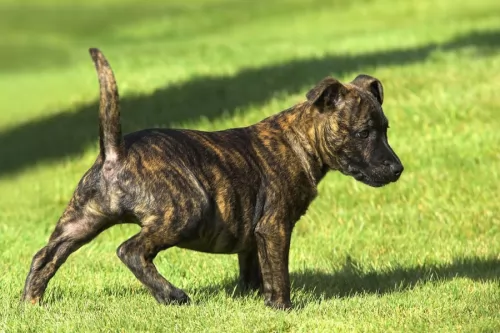 Weight of the Alaunt variates and it depended from dog to dog. The average weight of this breed was 20-68kg. While their height was 56-85cm. Females were slightly smaller with an average weight of 16-60kg, with a height of 50-80cm.
Weight of the Alaunt variates and it depended from dog to dog. The average weight of this breed was 20-68kg. While their height was 56-85cm. Females were slightly smaller with an average weight of 16-60kg, with a height of 50-80cm.
A lifespan of Alaunt was 10-12 years.
Litter Size of an average Alaunt was 6-10 puppies.
Other Names for Alaunt are White Kazbegi, White Balkan dogs, Alaunt Gentil, Alaunt de Boucherie, Boucherie
 St. John’s Water Dog is strong, medium sized and stocky. They looked more like English Labs than American Labs. They had a thick, short coat, loved swimming, had a lot of endurance and rudder tail. It was also described as a thin, black dog with short hair. They had white patches on their chest and feet. His nose was thin and tapered, his legs powerful, his chest muscular. The breed is quick, swims, runs quickly and is a fighter as well.
St. John’s Water Dog is strong, medium sized and stocky. They looked more like English Labs than American Labs. They had a thick, short coat, loved swimming, had a lot of endurance and rudder tail. It was also described as a thin, black dog with short hair. They had white patches on their chest and feet. His nose was thin and tapered, his legs powerful, his chest muscular. The breed is quick, swims, runs quickly and is a fighter as well.
Never accepted by any major kennel club except as a foundation breed. They became extinct.
Characteristics
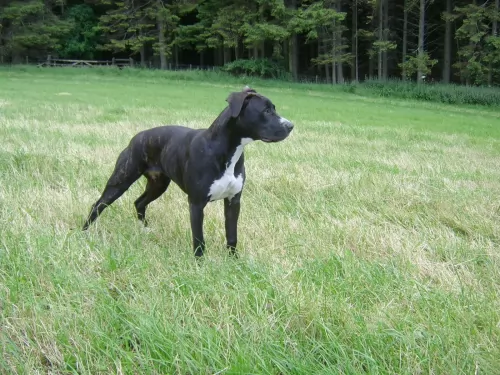 This breed was very powerful. They could adjust to any climate without any problems. Alaunt needed a lot of exercises because they were very strong and active dogs. They were also very intelligent dogs who knew what it wanted. People loved this breed because they were very smart, but also the perfect companion in every situation. Very protective but kind breed was loved in many countries.
This breed was very powerful. They could adjust to any climate without any problems. Alaunt needed a lot of exercises because they were very strong and active dogs. They were also very intelligent dogs who knew what it wanted. People loved this breed because they were very smart, but also the perfect companion in every situation. Very protective but kind breed was loved in many countries.
Characteristics
1.Children friendliness - yes they are good with children.
2.Special talents swimming is their best talent
 3.Adaptability large need fence, they are not large dogs but they need outdoor space
3.Adaptability large need fence, they are not large dogs but they need outdoor space
4.Learning ability – very smart and eager to learn
Health Problems
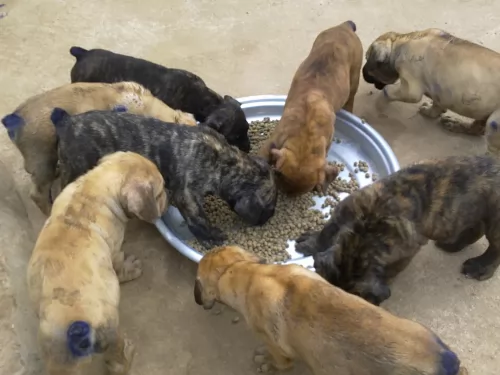 Alaunt was considered as a very healthy dog without any major issues. As every other breed they probably had some health problems, but overall this breed was very healthy and strong breed. Because of their health, they lived over 3000 years through many difficulties in the history of humankind.
Alaunt was considered as a very healthy dog without any major issues. As every other breed they probably had some health problems, but overall this breed was very healthy and strong breed. Because of their health, they lived over 3000 years through many difficulties in the history of humankind.
 There is no documented history of any genetic or hereditary illnesses in the breed. However, it seems rational to believe they suffered from ailments similar to Labradors and newfoundland though they are smaller dogs.
There is no documented history of any genetic or hereditary illnesses in the breed. However, it seems rational to believe they suffered from ailments similar to Labradors and newfoundland though they are smaller dogs.
No history like Labs and Newfoundlands .
- Hip and elbow dysplasia – can cause lameness and arthritis.
- PRA – progressive retinal atrophy – can cause blindness.
- Cancer – in their later years.
- Infectious diseases – not as serious as prior to vaccinations.
- Myopathy hereditary – affects the muscles.
- Ear infections.
-
Caring The Pet
Feeding the Alaunt
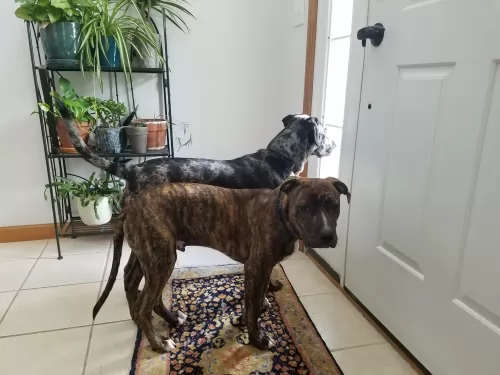 Since this breed extinct 300 years ago they probably eat leftovers from their owners.
Since this breed extinct 300 years ago they probably eat leftovers from their owners.
Grooming Alaunt
Grooming Alaunt was a very easy job, they had short and smooth hair so they did not require a lot of grooming.
 1Feeding the puppy – Don’t overfeed – they have a propensity toward obesity. Feed high quality, high protein 3 x a day.
1Feeding the puppy – Don’t overfeed – they have a propensity toward obesity. Feed high quality, high protein 3 x a day.
2.Feeding the adult – Don’t overfeed. Feed a high quality, high protein 1-2 x a day.
3.Points for Good Health - stamina
4. Games and Exercises – They need space to run and they love to explore. They would also love to be near water where they could swim. Good at dock diving, field trials, flyball and frisbee.
Comparison with other breeds
- Alaunt vs English Bulldog - Breed Comparison
- Alaunt vs German Shepherd - Breed Comparison
- Alaunt vs Golden Retriever - Breed Comparison
- Alaunt vs Labrador Retriever - Breed Comparison
- Alaunt vs West Highland White Terrier - Breed Comparison
- Alaunt vs French Bulldog - Breed Comparison
- Alaunt vs Beagle - Breed Comparison
- Alaunt vs Yorkshire Terrier - Breed Comparison
- Alaunt vs Poodle - Breed Comparison
- Alaunt vs Rottweiler - Breed Comparison
- Alaunt vs Boxer - Breed Comparison
- Alaunt vs English Pointer - Breed Comparison
- Alaunt vs Siberian Husky - Breed Comparison
- Alaunt vs Doberman Pinscher - Breed Comparison
- Alaunt vs American Bully - Breed Comparison
- Alaunt vs Abruzzenhund - Breed Comparison
- Alaunt vs Affenpinscher - Breed Comparison
- Alaunt vs Afghan Hound - Breed Comparison
- Alaunt vs Aidi - Breed Comparison
- Alaunt vs Airedale Terrier - Breed Comparison
- Alaunt vs Akbash Dog - Breed Comparison
- Alaunt vs Akita - Breed Comparison
- Alaunt vs Africanis - Breed Comparison
- Alaunt vs Askal - Breed Comparison
- Alaunt vs Atlas Terrier - Breed Comparison
- St. John's Water Dog vs English Bulldog - Breed Comparison
- St. John's Water Dog vs German Shepherd - Breed Comparison
- St. John's Water Dog vs Golden Retriever - Breed Comparison
- St. John's Water Dog vs Labrador Retriever - Breed Comparison
- St. John's Water Dog vs West Highland White Terrier - Breed Comparison
- St. John's Water Dog vs French Bulldog - Breed Comparison
- St. John's Water Dog vs Beagle - Breed Comparison
- St. John's Water Dog vs Yorkshire Terrier - Breed Comparison
- St. John's Water Dog vs Poodle - Breed Comparison
- St. John's Water Dog vs Rottweiler - Breed Comparison
- St. John's Water Dog vs Boxer - Breed Comparison
- St. John's Water Dog vs English Pointer - Breed Comparison
- St. John's Water Dog vs Siberian Husky - Breed Comparison
- St. John's Water Dog vs Doberman Pinscher - Breed Comparison
- St. John's Water Dog vs American Bully - Breed Comparison
- St. John's Water Dog vs Abruzzenhund - Breed Comparison
- St. John's Water Dog vs Affenpinscher - Breed Comparison
- St. John's Water Dog vs Afghan Hound - Breed Comparison
- St. John's Water Dog vs Aidi - Breed Comparison
- St. John's Water Dog vs Airedale Terrier - Breed Comparison
- St. John's Water Dog vs Akbash Dog - Breed Comparison
- St. John's Water Dog vs Akita - Breed Comparison
- St. John's Water Dog vs Africanis - Breed Comparison
- St. John's Water Dog vs Askal - Breed Comparison
- St. John's Water Dog vs Atlas Terrier - Breed Comparison
 Petzlover
Petzlover Alaunt is originated from Afghanistan but St. John's Water Dog is originated from Canada. Alaunt may grow 32 cm / 13 inches higher than St. John's Water Dog. Alaunt may weigh 27 kg / 60 pounds more than St. John's Water Dog. Both Alaunt and St. John's Water Dog has same life span. Alaunt may have more litter size than St. John's Water Dog. Both Alaunt and St. John's Water Dog requires Low Maintenance.
Alaunt is originated from Afghanistan but St. John's Water Dog is originated from Canada. Alaunt may grow 32 cm / 13 inches higher than St. John's Water Dog. Alaunt may weigh 27 kg / 60 pounds more than St. John's Water Dog. Both Alaunt and St. John's Water Dog has same life span. Alaunt may have more litter size than St. John's Water Dog. Both Alaunt and St. John's Water Dog requires Low Maintenance.  Alaunt is an extinct breed that existed 3000 years ago since 300 years ago. They were very popular dogs and people used them for many different tasks. They were a perfect working dog, but also they were used for wars and many other situations. Since the migrating was very common through the history, there were many different Alaunt breeds all over the Europe and Asia. Alaunt originated from central Asia, probably Afghanistan.
Alaunt is an extinct breed that existed 3000 years ago since 300 years ago. They were very popular dogs and people used them for many different tasks. They were a perfect working dog, but also they were used for wars and many other situations. Since the migrating was very common through the history, there were many different Alaunt breeds all over the Europe and Asia. Alaunt originated from central Asia, probably Afghanistan. The breed known as the St. John’s water dog is an extinct landrace breed. They were domestic dogs found in Newfoundland and at times were called the lesser Newfoundland. There is not much information available about the other breeds that went into its development. Hypothetically it is believed they are a mix of the Irish, Old English and Portuguese dogs bred to work.
The breed known as the St. John’s water dog is an extinct landrace breed. They were domestic dogs found in Newfoundland and at times were called the lesser Newfoundland. There is not much information available about the other breeds that went into its development. Hypothetically it is believed they are a mix of the Irish, Old English and Portuguese dogs bred to work. Weight of the Alaunt variates and it depended from dog to dog. The average weight of this breed was 20-68kg. While their height was 56-85cm. Females were slightly smaller with an average weight of 16-60kg, with a height of 50-80cm.
Weight of the Alaunt variates and it depended from dog to dog. The average weight of this breed was 20-68kg. While their height was 56-85cm. Females were slightly smaller with an average weight of 16-60kg, with a height of 50-80cm. St. John’s Water Dog is strong, medium sized and stocky. They looked more like English Labs than American Labs. They had a thick, short coat, loved swimming, had a lot of endurance and rudder tail. It was also described as a thin, black dog with short hair. They had white patches on their chest and feet. His nose was thin and tapered, his legs powerful, his chest muscular. The breed is quick, swims, runs quickly and is a fighter as well.
St. John’s Water Dog is strong, medium sized and stocky. They looked more like English Labs than American Labs. They had a thick, short coat, loved swimming, had a lot of endurance and rudder tail. It was also described as a thin, black dog with short hair. They had white patches on their chest and feet. His nose was thin and tapered, his legs powerful, his chest muscular. The breed is quick, swims, runs quickly and is a fighter as well. This breed was very powerful. They could adjust to any climate without any problems. Alaunt needed a lot of exercises because they were very strong and active dogs. They were also very intelligent dogs who knew what it wanted. People loved this breed because they were very smart, but also the perfect companion in every situation. Very protective but kind breed was loved in many countries.
This breed was very powerful. They could adjust to any climate without any problems. Alaunt needed a lot of exercises because they were very strong and active dogs. They were also very intelligent dogs who knew what it wanted. People loved this breed because they were very smart, but also the perfect companion in every situation. Very protective but kind breed was loved in many countries. There is no documented history of any genetic or hereditary illnesses in the breed. However, it seems rational to believe they suffered from ailments similar to Labradors and newfoundland though they are smaller dogs.
There is no documented history of any genetic or hereditary illnesses in the breed. However, it seems rational to believe they suffered from ailments similar to Labradors and newfoundland though they are smaller dogs. 1Feeding the puppy – Don’t overfeed – they have a propensity toward obesity. Feed high quality, high protein 3 x a day.
1Feeding the puppy – Don’t overfeed – they have a propensity toward obesity. Feed high quality, high protein 3 x a day.